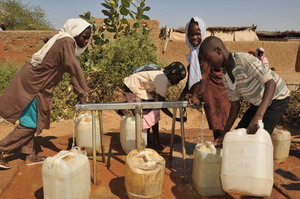 4 December 2018 – Six countries in WHO’s Eastern Mediterranean and African Regions have signed a declaration committing themselves to strengthening preparedness and response to public health threats and events across borders in an effort to further the implementation of the International Health Regulations (IHR 2005) and enhance global health security. The Khartoum Declaration on Sudan and Bordering Countries: Cross-Border Health Security was signed by Chad, Egypt, Ethiopia, Libya, South Sudan and Sudan on 22 November 2018 in Khartoum, Sudan.
4 December 2018 – Six countries in WHO’s Eastern Mediterranean and African Regions have signed a declaration committing themselves to strengthening preparedness and response to public health threats and events across borders in an effort to further the implementation of the International Health Regulations (IHR 2005) and enhance global health security. The Khartoum Declaration on Sudan and Bordering Countries: Cross-Border Health Security was signed by Chad, Egypt, Ethiopia, Libya, South Sudan and Sudan on 22 November 2018 in Khartoum, Sudan.
At the signing of the Declaration, His Excellency Dr Mohamed Abu Zaid Mustafa, Sudan’s Federal Minister of Health, stated that viruses and bacteria do not recognize borders, requiring countries to take action to protect the health of their populations.
“Health security and addressing public health threats are the responsibility of all and require the cooperation of individuals, communities, and institutions. WHO is supporting a coordinated and combined response that ensures all at-risk countries are able to prepare and respond to all threats, and that contributions to peace are made through health,” said Dr Naeema Al Gasseer, WHO Representative in Sudan.
As part of the Khartoum Declaration, countries pledged to establish a public health cross-border coordination centre to facilitate cross-border collaboration, develop a memorandum of understanding and implement activities to strengthen public health preparedness and response across borders. They also pledged to develop a monitoring and evaluation framework to track progress and to mobilize human, financial and logistical resources.
The Declaration was signed at the ministerial meeting held on the last day of a three-day WHO bi-regional meeting on cross-border collaboration between Sudan and its neighbouring countries.
The bi-regional meeting provided an opportunity for WHO and representatives from six countries, including national IHR focal points, to collectively review current public health threats and events, and discuss collaboration, challenges in implementing IHR (2005) capacities at ground crossings, best practices, and opportunities to enhance cross-border collaboration for early detection and rapid response to public health threats and events.
Common challenges were identified that contribute to the risk of diseases crossing borders, including unofficial ground crossings and porous borders, high levels of mass displacement and irregular patterns of migration, poor infrastructure at borders, and limited joint activities related to surveillance, information-sharing, risk assessment and response across borders.
Through the implementation of technical frameworks for bilateral and multilateral collaboration over the next two years, countries will be able to successfully address and strengthen areas of mutual concern that make them vulnerable to public health threats, thereby increasing health security for millions of vulnerable people. This will include conducting all-hazard strategic risk assessments for ground crossings and other unofficial routes, reviewing and modifying legislation, polices and administrative procedures related to ground crossings to ensure IHR (2005) compatibility, establishing platforms for effective coordination, communication and information-sharing, enhancing surveillance and laboratory services, and conducting risk communication and workforce development activities across borders.



